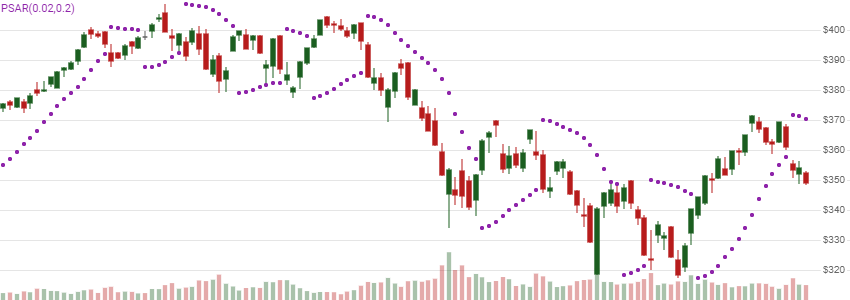Parabolic SAR
Created by J. Welles Wilder, Parabolic SAR (stop and reverse) is a price-time based indicator used to determine trend direction and reversals. [Discuss] 💬

// C# usage syntax (standard)
IEnumerable<ParabolicSarResult> results =
quotes.GetParabolicSar(accelerationStep, maxAccelerationFactor);
// alternate usage with custom initial Factor
IEnumerable<ParabolicSarResult> results =
quotes.GetParabolicSar(accelerationStep, maxAccelerationFactor, initialFactor);
Parameters
accelerationStep double - Incremental step size for the Acceleration Factor. Must be greater than 0. Default is 0.02
maxAccelerationFactor double - Maximum factor limit. Must be greater than accelerationStep. Default is 0.2
initialFactor double - Optional. Initial Acceleration Factor. Must be greater than 0 and not larger than maxAccelerationFactor. Default is accelerationStep.
Historical quotes requirements
You must have at least two historical quotes to cover the warmup periods; however, we recommend at least 100 data points. Initial Parabolic SAR values prior to the first reversal are not accurate and are excluded from the results. Therefore, provide sufficient quotes to capture prior trend reversals, before your intended usage period.
quotes is a collection of generic TQuote historical price quotes. It should have a consistent frequency (day, hour, minute, etc). See the Guide for more information.
Response
IEnumerable<ParabolicSarResult>
- This method returns a time series of all available indicator values for the
quotesprovided. - It always returns the same number of elements as there are in the historical quotes.
- It does not return a single incremental indicator value.
- The first trend will have
nullvalues since it is not accurate and based on an initial guess.
ParabolicSarResult
Date DateTime - Date from evaluated TQuote
Sar double - Stop and Reverse value
IsReversal bool - Indicates a trend reversal
Utilities
See Utilities and helpers for more information.
Chaining
Results can be further processed on Sar with additional chain-enabled indicators.
// example
var results = quotes
.GetParabolicSar(..)
.GetEma(..);
This indicator must be generated from quotes and cannot be generated from results of another chain-enabled indicator or method.